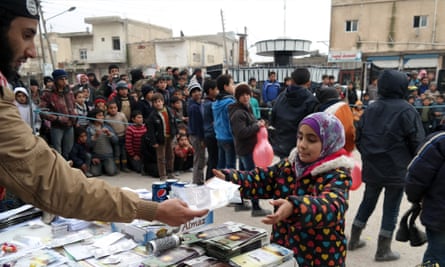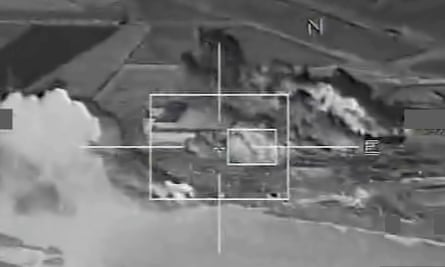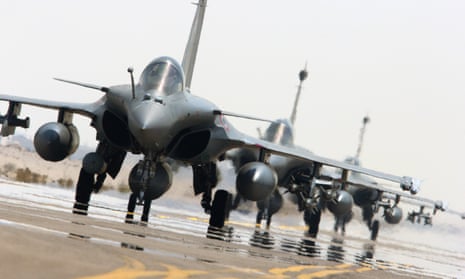Residents of Raqqa, the Syrian city that is Islamic State’s de-facto capital, remain largely indifferent to the prospect of Britain joining the air campaign, an activist based there has said.
Activists and experts maintain that yet another force bombing the militants will do little if it is not part of a broader strategy to address the threat of the terror group and the violence perpetrated by the regime of the president, Bashar al-Assad.
Many in the city see the coalition campaign as ineffective at stemming the expansion of Isis and argue it is primarily aimed at containing the militants rather than destroying them, though those who oppose the terror group view Britain joining the coalition in Syria positively.
“Britain has a powerful intelligence service and knows where to strike and when, not like the coalition. You feel they just want to launch missiles on Isis headquarters even if they’re empty,” said Tim Ramadan, the pseudonym of an activist and journalist working clandestinely in the city, on Wednesday. “[Drones] are the organisation’s biggest fear.
Ramadan, who works with Raqqa Is Being Slaughtered Silently, a group documenting Isis crimes, added: “The airstrikes have become routine and people believe the international community does not want to end Daesh [the Arabic acronym for the group], they just want to weaken it.”He said few residents feared coalition airstrikes, although former residents of the city who have fled across the border to Turkey told the Guardian last week of civilian casualties suffered even under carefully targeted bombardment.
While children and elderly people are often startled and disturbed by the sounds of the explosions, activists say the airstrikes tend not to hit civilian areas. Most, however, fear Russian airstrikes as they tend to target civilian neighbourhoods.

Britain has deployed drones in the past in Raqqa, targeting UK citizens that David Cameron said were plotting attacks against British targets.
But the escalation of British involvement into a full-blown aerial campaign is unlikely to change much on the ground without a broader strategy for the crisis in Syria. Despite the coalition campaign, Isis this year seized the historic city of Palmyra in Syria and Ramadi, the capital of Anbar province in Iraq.
“The current campaign has not been doing much to root out Isis beyond containing it militarily in some areas in north-eastern Iraq and Syria,” said Hassan Hassan, associate fellow at Chatham House and co-author of a bestselling book on the group, Isis: Inside the Army of Terror. “Britain’s involvement won’t make a difference unless it focuses on encouraging and propping up local forces to fight Isis and ensure that the UK’s position towards Bashar al-Assad is crystal clear.
“If talk we hear coming out of some British politicians that Isis is the priority and not Assad leads to a policy that reflects that position, then that is a bad start. The trick is to work with local forces to uproot Isis and that cannot happen without gaining the trust of those forces for whom the removal of Assad is the priority number one.”
Isis has come under increasing pressure recently. In Iraq last month, the Kurdish peshmerga backed by US airstrikes and Yazidi fighters evicted the militants from the ancestral Yazidi city of Sinjar. The recapturing came at great cost, however, with much of the city levelled in the process.
Iraqi forces have also surrounded Ramadi, the capital of Anbar province, which Isis conquered in May after thousands of Iraqi soldiers fled in the face of an advance by a few hundred militants.
In response, the group appears to have shifted tactics to attacks abroad, with the coordinated assaults on Paris last month and a double suicide bombing in the Lebanese capital of Beirut, the deadliest terrorist attack to hit the city since the end of the civil war there.

Observers say there has to be a broader strategy to back moderate rebels aiming to overthrow Assad. Previous efforts to train moderate rebels by the US have failed, primarily because many opposition fighters see Assad and his relentless aerial bombardment of rebel-held areas as the prime threat even though many have battled against Isis at great cost across the country.
In addition, while the coalition campaign has been effective in helping local ground forces retake lost territory – including the destruction of Isis forces last year at the Kurdish border town of Kobani – they failed to stop Isis conquering the historic city of Palmyra, where the group has destroyed priceless ancient artefacts, or the conquest of Ramadi, both of which happened this summer.
Nor has it succeeded in degrading Isis power and authority in Raqqa, activists in the city say.
It is difficult to assess the overall mood in Raqqa. Isis has banned almost all avenues for accessing the internet at home and issued a standing order more than a month ago that bars anyone from leaving the city except in extraordinary medical circumstances.
